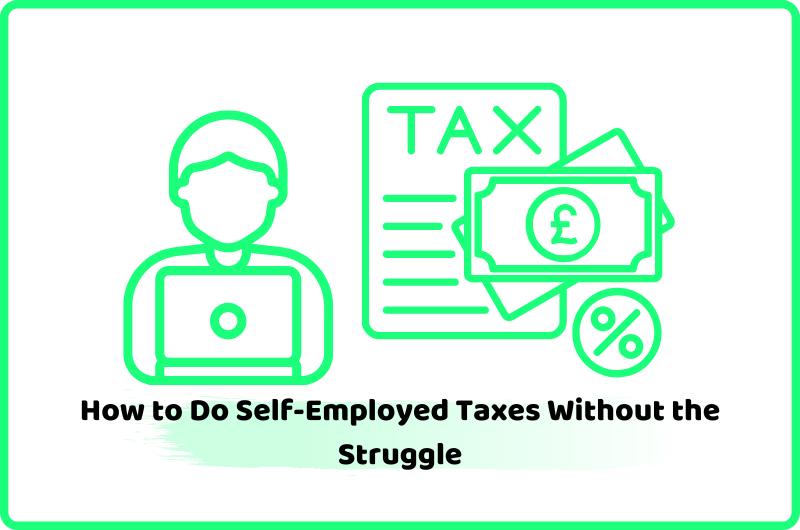How to Do Self-Employed Taxes Without the Struggle
Self-employed individuals in the UK must correctly manage their taxes to maintain HMRC compliance and prevent penalties. Self-employed people handle all tax preparation tasks from calculations through reporting up to payments in contrast to typical employees. Everything necessary to handle self-employed taxes successfully and understand how to do self-employed taxes will be explained in this comprehensive guide.
Need help with your Self Assessment Tax Return? Let us make it simple for you.
Registering as Self-Employed
To begin the tax filing process, you should first register your self-employed status with HMRC. You need to understand how to do self-employed taxes. You must perform this registration by the 5th of October after your business started during the tax year.
How To Register As Self-Employed?
- Visit the HMRC website.
- Every new registrant should first establish their Government Gateway profile unless they already possess one.
- You must submit personal details together with business information while providing your National Insurance number.
- HMRC sends your Unique Taxpayer Reference (UTR) to your registered address through post.
- To begin the process, you need your Unique Taxpayer Reference number to perform tax return filing with Self-Assessment.
How to Do Self-Employed Taxes & File Self-Assessment
A self-employed person must send their Self-Assessment tax report to HMRC every tax year. The tax year starts on 6th April and ends on 5th April, with these tax return deadlines.
- 31st October (paper tax return deadline).
- 31st January (online tax return deadline and payment deadline).
Procedure to File Your Tax Return
Here is the procedure to file your tax return in very simple wording, about which information you need to know.
- Gather Your Records: You need to maintain a complete set of records showing all incoming and outgoing funds plus business documents.
- Log into HMRC: Sign in to HMRC through Government Gateway by providing your login credentials.
- Enter Your Earnings: Please record all the self-employment money you made during the year.
- Deduct Allowable Expenses: Business expense claims help decrease your taxable income from your self-employed income.
- Calculate Your Tax and NI Contributions: The system will automatically determine your tax plus NI requirements based on the data you provided.
- Submit and Pay: By 31 January, pay and submit your taxes to escape late payment penalties.
Tax Rates for Self-Employed Individuals
As a self-employed individual, you need to know how much tax will i pay as a self-employed individual. You must pay income tax and national insurance on your profits. Knowing the tax rates can help you plan and avoid any surprises like penalties and extra charges.
1. Income Tax
Self-employed individuals pay tax based on their annual earnings:
| Tax Band | Income Range | Tax Rate |
| Personal Allowance | Up to £12,570 | 0% |
| Basic Rate | £12,571 – £50,270 | 20% |
| Higher Rate | £50,271 – £125,140 | 40% |
| Additional Rate | Over £125,140 | 45% |
2. National Insurance Contributions (NICs)
If you are self-employed and earn above a specific limit, you must pay National Insurance for the self-employed. Self-employed individuals pay two types of NICs:
- Class 2 NICs: These are payable tax ratio if your profits are less than £6,725 per year (£3.45 per week in 2024/25).
- Class 4 NICs: Payable on profits over £12,570:
- 6% on profits between £12,570 and £50,270.
- 2% on profits over £50,270.
Allowable Expenses for Self-Employed Individuals
When you record accepted business costs, you pay fewer taxes on your earnings. Some common self-employed expenses include:
- Office Costs: You need to pay for your workplace, including rental expenses, plus internet and phone services.
- Travel Costs: Money spent on driving and traffic, plus public transport and work-related travel.
- Marketing and Advertising: You Will Need Money to Launch Your Sales and Marketing Plans.
- Professional Fee: Accountants, legal fees, and subscriptions.
- Equipment & Supplies: Laptops, software, and tools.
Keeping organised expense records gives you the proof needed to explain them if HMRC asks.
Payment on Account:
If your tax bill is £1,000, the HMRC requires payment on account. It means you pay the tax in advance for the next year. The due dates for this tax payment are given below:
- 31st January is the date of the first payment on account.
- 31st July is the date of the second payment on account.
Common Mistakes to Avoid
There are some mistakes that most people make; it is sure to avoid them:
- Missing Deadlines: If you pay the tax late, this results in a £100 penalty. If you continue to delay, you will face extra charges.
- Not Keeping Records: The HMRC requires you to keep your records for at least five years.
- Forgetting to Budget for Tax Payments: You don’t forget to budget your tax payments. Set aside a part of your income to cover your tax.
- Incorrect Expense Claims: Make sure to claim your business expenses to stay compliant and avoid unnecessary investigation from HMRC.
- Ignoring Payments on Account: Remine is mindful of advance tax payments to ensure smooth cash flow management.
Conclusion
If you are self-employed in the UK, you need to keep good records and filing your taxes on time is required. Understanding how to do self-employed taxes, knowing which expenses you can claim, and tracking the deadlines help you to be organised and avoid any fines. If you manage your tax return by yourself or you get help from the experts. You must stay informed and make this process smooth and stressless.
Self-employed taxes require simple procedures while learning how to do self-employed taxes. You need to perform deductions for tax compliance purposes. Contact us now to receive expert assistance that will help you deal with your taxes without difficulty.


